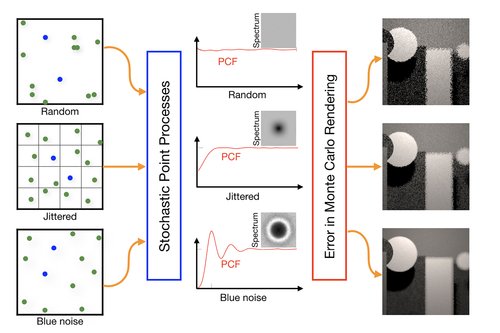-
 Full Conference Pass (FC)
Full Conference Pass (FC)
-
 Full Conference One-Day Pass (1D)
Full Conference One-Day Pass (1D)
Date: Friday, December 7th
Time: 11:00am - 12:45pm
Venue: Hall D1 (1F, D Block)
Summary: Point patterns and stochastic structures lie at the heart of Monte Carlo based numerical integration schemes. Physically based rendering algorithms have largely benefited from these Monte Carlo based schemes that inherently solve very high dimensional light transport integrals. However, due to the underlying stochastic nature of the samples, the resultant images are corrupted with noise (unstructured aliasing or variance). This also results in bad convergence rates that prohibit using these techniques in more interactive environments (e.g. games, virtual reality). With the advent of smart rendering techniques and powerful computing units (CPUs/GPUs), it is now possible to perform physically based rendering at interactive rates. However, much is left to understand regarding the underlying sampling structures and patterns which are the primary cause of error in rendering. This course surveys the most recent state-of-the-art frameworks that are developed to better understand the impact of samples' structure on the error and its convergence during Monte Carlo integration. It provides best practices and a set of tools for easy integration of such frameworks for sampling decisions in rendering. We revisit stochastic point processes that offers a unified theory explaining stochastic structures and sampling patterns in a common principled framework. We show how this theory generalizes spectral tools developed over the years to analyze error and convergence rates, and allows for analysis of more complex point patterns with adaptive density and correlations. At the end of the course, the audience will have a comprehensive understanding of both theoretical and practical aspects of point processes that would guide them in choosing and designing sampling strategies for applications specific to Monte Carlo rendering. A codebase and web application for easy use of the introduced techniques will also be made available.
Author(s)/Speaker(s):
Moderator: Gurprit Singh, Max Planck Institute for Informatics, Germany
Lecturer(s): A. Cengiz Oztireli, Disney Research, Switzerland
Gurprit Singh, Max Planck Institute for Informatics, Germany
Author(s)/Speaker(s) Bio:
Dr. Gurprit Singh is currently a post doctoral research associate at Max Planck Institute for Informatics, Saarbrücken. His research is focused on analyzing the impact of different sampling patterns on Monte Carlo based rendering algorithms. His recent works include developing advanced Fourier domain tools for convergence analysis that also results in new design principles for novel futuristic samplers. He obtained his Ph.D. in 2015 from the Université de Lyon 1, France, under the supervision of Prof. Victor Ostromoukhov which was followed by a two year post-doc at Dartmouth College with Prof. Wojciech Jarosz.
Dr. Cengiz Oztireli is currently a Research Scientist at Disney Research Zürich. His research interests are in computer graphics, vision, and machine learning. With his collaborators from academia and industry, he has been publishing works in international journals and conferences. He obtained his M.S. and Ph.D. degrees in computer science from ETH Zurich (jointly funded by the Swiss National Science Foundation), and completed a double major in computer engineering and electronics engineering at Koc University (valedictorian). He has been honored with several awards including the Eurographics Best Ph.D. Thesis Award and Fulbright Science and Technology Award.
Dr. Gurprit Singh is currently a post doctoral research associate at Max Planck Institute for Informatics, Saarbrücken. His research is focused on analyzing the impact of different sampling patterns on Monte Carlo based rendering algorithms. His recent works include developing advanced Fourier domain tools for convergence analysis that also results in new design principles for novel futuristic samplers. He obtained his Ph.D. in 2015 from the Université de Lyon 1, France, under the supervision of Prof. Victor Ostromoukhov which was followed by a two year post-doc at Dartmouth College with Prof. Wojciech Jarosz.




